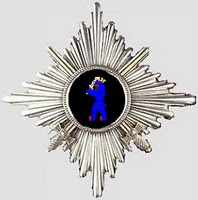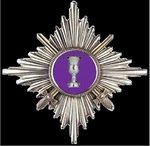I've long been a fan of these rules, ever since I got totally turned off by an overly detailed Napoleonics game in which extremely unreal events happened and true player initiative was difficult. This happened at an HMGS East convention, which can be a lot of fun, even though I was primarily an ancients gamer / WRG VI in those days.
I then had three Koenig's Krieg games in a row in which I was not prohibited from attempting things which forces of those periods attempted. The "Festung Krieg" rules were still not officially adopted then, and I got to play a round which I still feel was my outstanding performance at a convention game.
Alas, Koenig's Krieg is currently out of print, though the odd copy can still be found in some shops and it does show up on various second hand forums from time to time.
There is good news on that front, however. Not only are the current copyright holders working on bringing out a new edition (the last one had a lot of typos and poor illustrations), but also, there's a rumor that in spite of several annoying delays in their project, something good may happen soon.
Now, about those rules.
Koenig's Krieg is a deceptively simple set. Like chess, I've found it to incorporate surprising complexity in actual play.
It is based on 15mm / 12 figures = battalion usually (1 figure = @ 50 men). One inch (yep, it's inches, not millimeters)= @ 200 feet. Adaptation to 24 figure battalions and 25mm figures are fairly easy. Combat is fairly abstracted, with the eye candy of different formations extremely simplified.
On the other hand, K.K. features an "initiative" roll system, in which the winner declares who acts (one brigade at a time) ... and this roll occurs several times in a single phase, as most games will involve at least two brigades on a side. While I've seen this choice feature in other games, I've not seen it repeated in a single phase ... and the proper use of this choice can be quite decisive in that turn's events.
Secondarily, the turns are divided into operation phases ... combat is actually a function of movement in this game ... so instead of the usual move / fight simplicity, one has to choose to more or to shoot ... and only those units which have moved close enough can later act in the "close combat" phase ... which means, among other things, that unless you're careful, your cavalry will get shot down on its approach to charge distance!
These game mechanics underscore a unique feature of the period ... things actually did not happen exactly simultaneously. Who gets off the first volley can be decisive. Even though tactical considerations such as range, first volley bonus, platoon versus rank firing etc. are not considered, the unpredictability of who gets to do what next can generate quite unexpected and exciting turns of momentum within a single "turn" of the game.
In Seifreidsburg, for instance, the Jaegers performed much better than I expected. Furthermore, I would have bet that the Rotheisen Grenadiers would have been destroyed before they took the Grand Battery ... Santa Anna made a similar mistake in the Mexican American War. But, once it had happened, their heroic and suicidal attack actually made sense in the period dynamics!
Also, the nefarious Lt. General of the first wave managed to get his forces sufficiently dispersed as to leave them effectively all out of command ... Rosenblum's activation rolls were consistently, extremely good: which contributed to the constant attack against Lt. Oberst Sanders' battalion.
While K.K. functions quite well on brigade and larger scale, I've found it difficult for a single player to handle more than twenty or so battalions. So a "corps" sized game is about the largest I'd attempt myself (I have to game solo most of the time). On the other hand, the nice simplicity of the game makes it unsuitable for me for anything smaller than a brigade sized engagement. At the smaller scale, intricate details of range, tactics, formation, and so forth are much more important, and gaming at that level, for me, requires rules to consider ... and to portray such distinctions visibly.
If you do get a chance to try these rules, I predict that you will enjoy them.
I just wish I could have a live, face to face opponent who really understood them so I could learn much better how to exploit their unique subtleties.
:)
Arthur
Saturday, October 13, 2007
Subscribe to:
Post Comments (Atom)







3 comments:
Arthur,
Thank you for your Koenig Krieg comments. I do need to see if I can dig my old copy of the rules out and re-read them.
I believe that at least two of our "Emperor vs Elector" members live "next door" to you (well, somewhere in Texas) . . . perhaps one of them may be close enough that a game could be arranged . . . or they might know someone who plays KK.
Ed Youngstrom (Hesse-Fedora) is in San Antonio -- okay, that's not quite next door; and Bill McHenry (M'Uedail) simply lists his address as in Texas.
You might try contacting these men and seeing if they know anyone who might be close enough to join you for a KK game.
-- Jeff
There used to be a group which played K.K. in Louisiana, but as far as I can tell, they've gone moribund ... I litterally live hours from anywhere, there're gamers in Fayeteville, AR., Little Rock, AR., Memphis, Tn., and Springfield, MO. that I've heard about ... and all of those locations are over three hours drive away ... I'd need to drive up the day before the game, stay overnight, and go back the next day ... and at modern motel prices, that's been prohibitive lately (sigh, as usual)
So I was quite excited when it seemed that I'd be able to get into the Illinois fun ... then we had a chance to get my wife an expensive bit of gear for her studio ... something she's wanted for 15 years.
So my treasure is where my heart really is, though it was disappointing!
Well perhaps I can get Stagonia to fight someone and let you run the battle by proxy . . . after all, they've threatened it enough times . . .
I'll see what I can do once I'm off of these pain pills that fog my mind up (just a strained back . . . nothing that won't pass).
-- Jeff
Post a Comment